The COVID-19 crisis has exposed the vulnerability of many disadvantaged social groups. Among these groups, refugees and asylum-seekers are particularly at risk, with limited visibility and restricted access to public services. Since 2015, Athens has become a main hub on the refugee route, facing the challenges of addressing the needs of tens of thousands of newly arrived people, accommodating them and preparing them for a new life. As a response to these challenges, the Athens Municipality has developed a series of new, innovative methods to help refugees develop new skills and relationships in their new home. Curing the Limbo is a project funded by the EU’s Urban Innovative Actions programme, connecting the aspects of education, active citizenship, employment and housing in efforts to help the integration of refugees. Cooperative City in Quarantine #9 invited the protagonists of Curing the Limbo to explore how the COVID-19 crisis has influenced the programme’s implementation, the situation of refugees and their opportunities in the housing and labour markets.
Our guests for Cooperative City in Quarantine #9 – REFUGEES were partners of the Curing the Limbo project funded by the Urban Innovative Actions programme. UIA finances original, innovative solutions for the most important challenges European cities face today. Athens has been running this programme for a couple of years, focusing on how to help refugees in Athens establish their new life in the city through education, employment, housing and community involvement. By connecting these aspects of what it means to find a new home and build a new life in a new city, Curing the Limbo offers a complex path to the social inclusion of refugees.
Host: Levente Polyak (Eutropian)
Guests for this webinar included:
– Antigone Kotanidi (Project manager of Curing the Limbo)
– Thalia Dragona (National and Kapodistrian University of Athens – education)
– Haris Biskos (Synathina – community involvement)
– Stefania Gyftopoulou (Catholic Relief Services – housing)
– Anastasia Sikiaridi (International Rescue Committee – employment)
– Mohamed Tayeb (Participant of Curing the Limbo)
The trajectory envisioned within the project allows recognised refugees to participate in a series of language courses, audio-visual and ICT trainings, as well as employment housing readiness trainings. These activities help them develop their skills, gradually enter the job market and access housing. Furthermore, refugees are encouraged to engage with community activities in various Athens neighbourhoods, building new relationships and networks.
Levente Polyak: When you put together the programme for Curing the Limbo, you conceived a trajectory for the participants that includes education, building soft skills, audio visual activities and even information technology. The beneficiaries would go to job trainings, and engage in searching for housing with the help of the housing team that would help them better understand how the housing market works, how to present themselves in the whole process. What makes Curing the Limbo special is that it also focusses on how to engage with civic initiatives and neighbourhoods.
What happens to someone who enters the programme and wants to make Athens their new life? How was it for you Mohamed, what were your steps in entering the programme?
Mohamed Tayeb: I had a very fast start. The first time I connected with Curing the Limbo, I was interviewed and could actually start Greek language lessons the next day. I was offered audio visual classes too and I took photography lessons as well. I was also offered housing support. It took some time, but finally I received housing as well. For me it is a really beautiful experience getting to know Greek society – I am lucky to be in this programme.
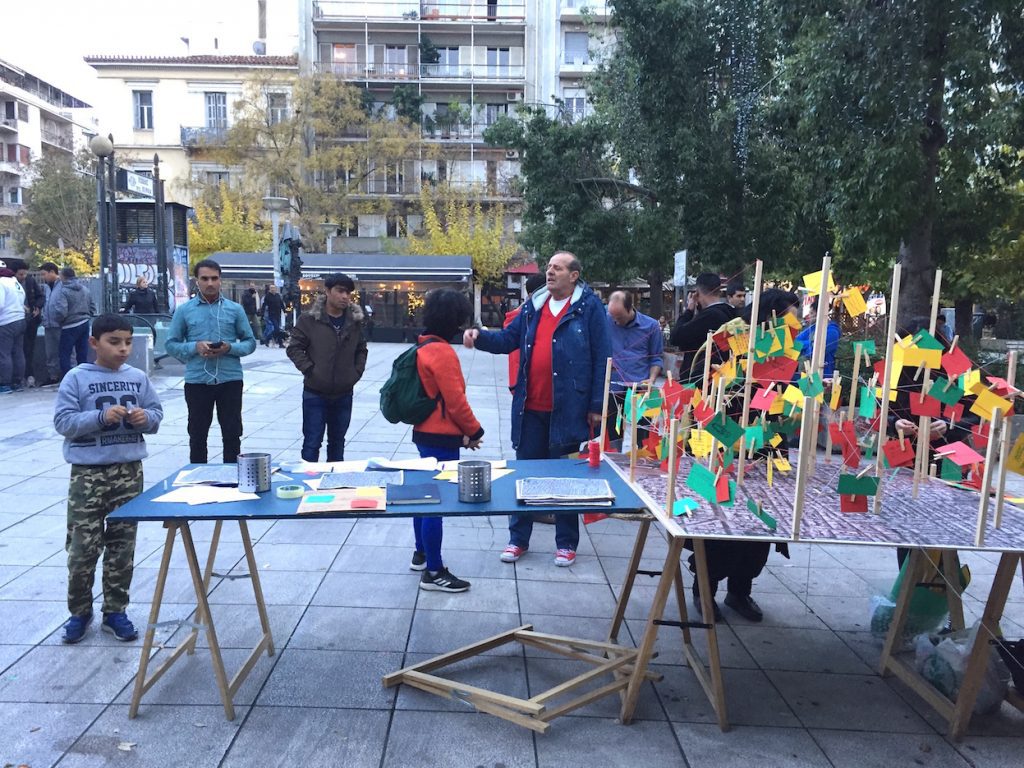
Many of the project’s activities are based on personal encounters and presence. How did COVID-19 interfere with your activities and the lives of refugees due to the interruption of the many events and processes they were part of before?
Antigone Kotanidi: We are readapting the programme to a new reality after a two-month period of working from home. With the help of new tools and reorganising our activities, we managed to keep in touch with many participants from the programme despite the lockdown arriving very suddenly.
At the core of Curing the Limbo there is a communal space, a Lab, with lots of human interaction. This is where most encounters take place, where participants of the programme can also find a safe place. How did losing this physical aspect of your activities for a period affect the programme?
Antigone Kotanidi: Our programme is about the limbo of the people who are waiting; we would help them with their first step in making a life in the city. When we went into limbo ourselves during the outbreak, the question was how should we reconnect with our team and participants online? Actually, it went very well and the situation brought us closer. We had additional time to discuss gaps in the programme, the many meetings gave us more space to discuss what we did not always have time for in person. I was wondering how relevant can our holistic approach be without a space to meet in. How can our services stay relevant? Lots of our participants do not have internet connection. The will and the tools were there, but it wasn’t always easy to connect with the participants.
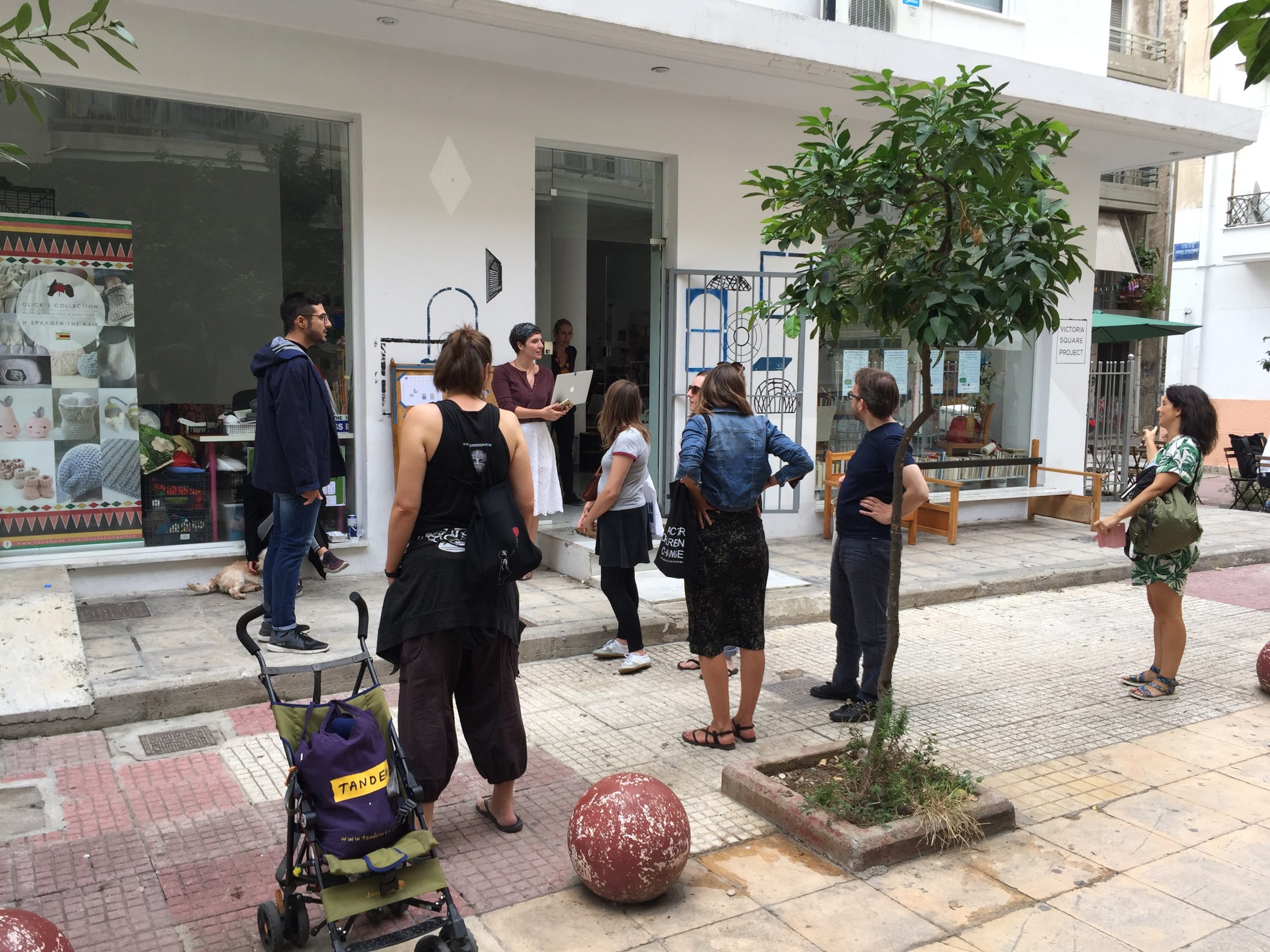
A big part of this programme is education, learning languages and skills. How did you adapt your curricula in this special period?
Thalia Dragona: We experimented with online learning but rather than calling it online learning we should use the term “emergency remote learning,” i.3. a temporary shift to an alternative mode due to crisis circumstances. The transition to online activities brings inequalities, especially in our programme, as many students didn’t have a computer. Therefore, we organised classes through WhatsApp and Viber through their phones, using also the Web 2.0 platform. We had to establish content with the students, then cater to individual needs. We had to rethink what learning is all about. Training we provide contributes to their resilience. We hold their hands through this difficult time. The students really appreciated it and it felt we were part of a family. We also had to retain a sense of continuity of the learning process and build on both students’ and instructors’ commitment. It became learning without walls and we became guests in their homes.
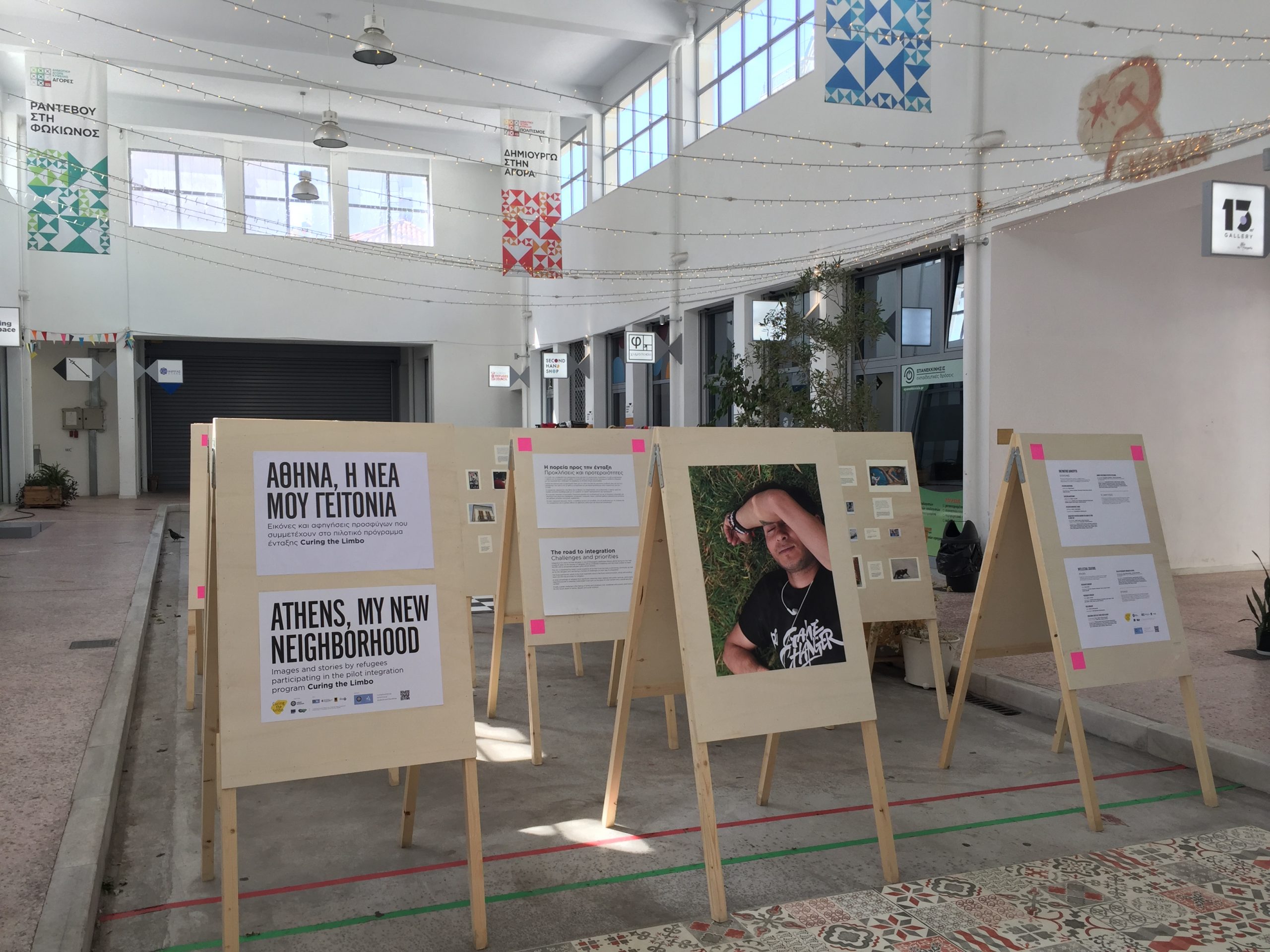
How did your students, the refugees adapt to this new form of classes?
Thalia Dragona: Many students come from traditional backgrounds where school is very bounded, so it felt to them at the beginning that it wasn’t a real class. Both teachers and students became very creative. For the photography classes, they created a website and uploaded their photos taken from their homes. The aim was to rethink what home means, their past memories and current experiences. COVID-19 presented a challenge to learning that was not imagined before. It revealed the need for information infrastructure that we have to secure. The future of Curing the limbo will probably be a hybrid experience of face to face and remote learning. It really benefitted their resilience.
The education curriculum of Curing the Limbo is closely connected to the city of Athens. Students are encouraged to engage with community activities that work on improving the quality of life in the city. They are also invited to join classes in specific locations, events in various neighbourhoods. This is not possible right now: how did you keep people involved?
Harris Biskos: One of the main aspects of Curing the Limbo is that it puts citizens at the core of a process that leads to inclusion into society and the city. We have been investing a lot in the relationships between refugees and the citizens of Athens, community groups, people working with their neighbourhoods to change the life of the city. We connected refugees with these initiatives, empowering and supporting collaborative activities in Athens between them. These relationships allow refugees better integrate into the life of Athens. We work with 20 community groups in Athens and around 60 refugees who do collaborative projects together. This is a very exciting moment for us. The virus hit this process: therefore, we began to organise Zoom meetings and Facebook groups to start thinking together about activities that can help change the city.
What impact did the lockdown have on those relationships?
Harris Biskos: Difficulties bring us closer. Just like during the recession years, people came together. We have to learn how to use different tools and overcome difficulties. Refugees face several challenges in terms of access to Wi-Fi, computers and media. Access to tools is something we have to overcome. Digital tools help you to tailor your communication.
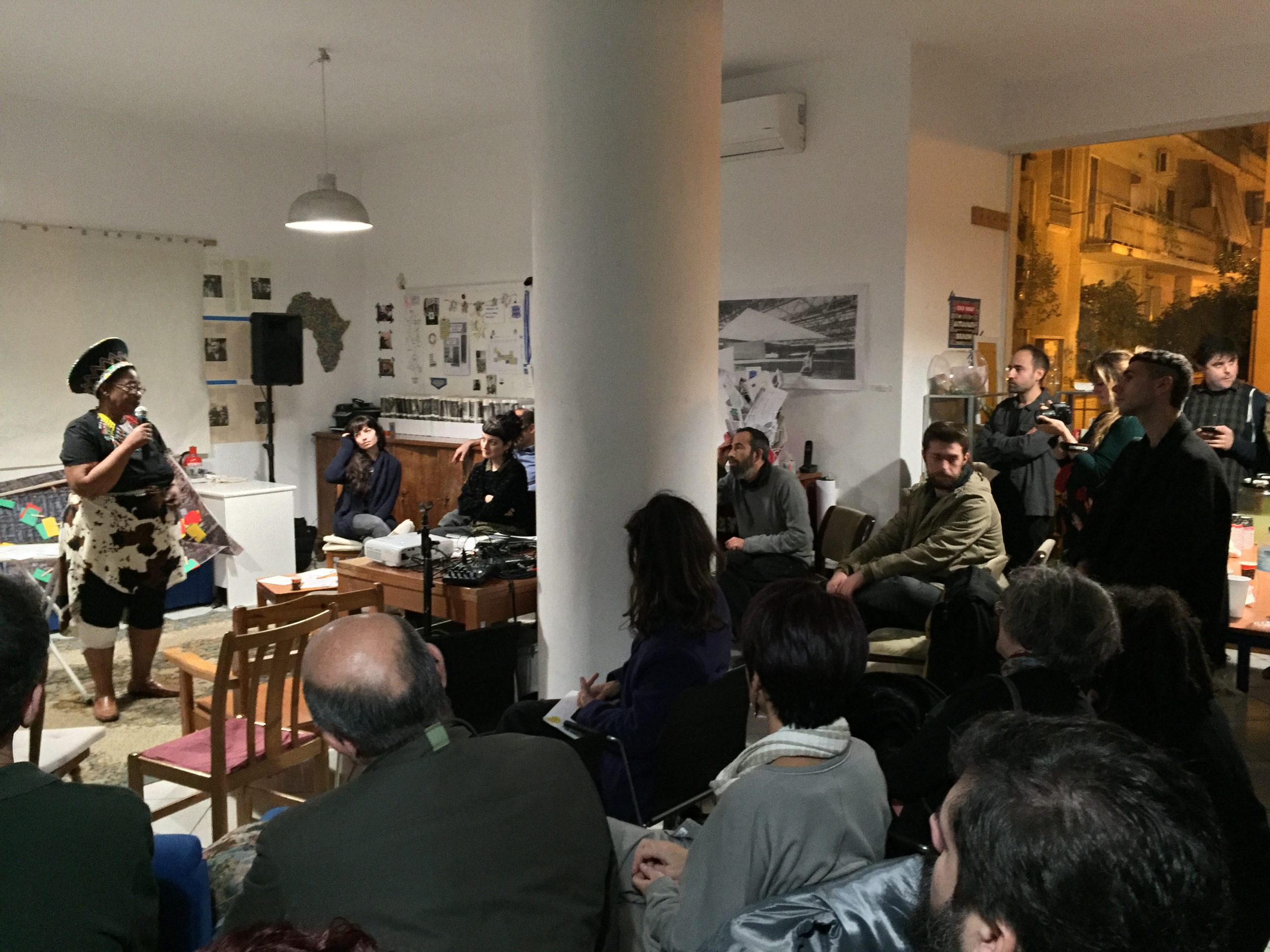
You also help refugees build a set of skills to help find jobs. How is your work influenced by the current situation? How is the economy is changing? How do you see the next months and years?
Anastasia Sikiardi: We moved many of our activities online: we piloted virtual job readiness training through Zoom and we do mock interviews on the phone. When it comes to changes in the economy, people did not know how to access certain benefits that were put in place by the state so we guided people to the next steps. We continued to focus on what you can learn in order to get a job, and we also targeted outreach to certain sectors with extended hours of work during this time such as supermarkets, logistics or delivery companies because they had to respond to the lockdown. We have actually four refugees who found jobs in this period. Of course, there are others who lost jobs. We have to understand that a lot of seasonal jobs in sectors like tourism that the refugees were going to take are not going to be available at the scale as before. We always say that we are not here to get you a job but to give you information on how to look for it. There are agricultural jobs now coming up but it depends if the refugees are willing to relocate as these jobs are outside of Athens.
Mohamed, you had a very special trajectory when you ended up working in a theatre production. How is the theatre doing? How do you see your chances with the theatre?
Mohamed Tayeb: I was working for the theatre production of the Phantom of the Opera at the time that the coronavirus started. When we had to go home and close ourselves in lockdown, I was really sad. At the moment the theatre is closed and there is no news. I don’t know if we will renew. Last week however I got a job offer from a call centre although I would like to stay with the theatre sector. But you have to adapt.
Housing is a fundamental need in the process of settling in a new city. Curing the Limbo is designed to use unrented apartments of public, institutional and private property owners as subsidised housing for refugees. First the arrival of mass tourism and short-term rentals, then the COVID-19 lockdown have both affected the process of finding homes for refugees. What are your expectations for the coming period?
Stefania Gyftopoulo: We act as an intermediary between property owners and beneficiaries by offering both owners and refugees a range of support services and financial assurances. With the COVID-19, we reduced physical meetings and looked at apartments through video calls; we incorporate new tools to continue deliver our services. Tourism is now on hold now and we do see an increase in long term rentals especially with smaller apartments. It is mostly until September though so it is early to say what will be the effect of the crisis on Airbnb apartments. We have seen a small drop in rent prices as well.
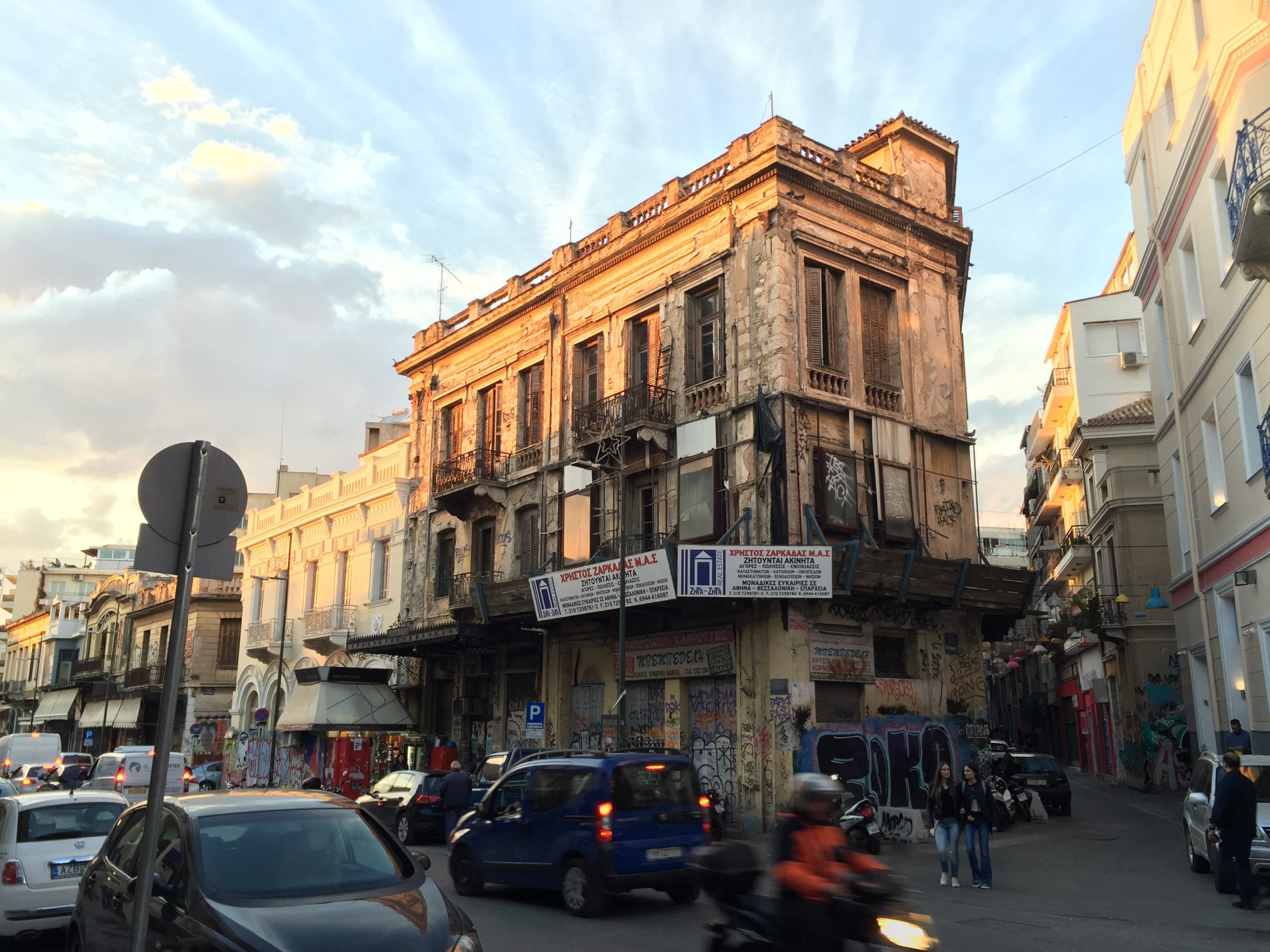
We witnessed a forced digitalisation in education, work and many other fields of life. You had to move many of your activities online. How do you see the effects of digital technologies on the relationships you have been building in Curing the Limbo?
Thalia Dragona: Digital tools are not a substitute but it is interesting to see how this experience can be adapted. There is a lot of potential and creativity in technology. Human touch and human contact are irreplaceable but it is not an “either or” situation.
In countries like Hungary, the power tried to blame migrants and foreign students for the arrival of the coronavirus. Do you feel any specific changes in attitude towards refugees during the lockdown in Athens?
Thalia Dragona: Before COVID-19 there were lots of discussions about the refugees due to the issues at the border, with stigmatisation and prejudice. The lockdown shifted the attention away and this animosity dropped. It stopped an escalation of xenophobia. I guess it is going to rise again. It showed that it was not the dispossessed who brought the virus – the opposite.
Community activities organised by neighbourhood groups and citizen initiatives are at the heart of the project. Will these activities be strengthened by the experience of a new kind of solidarity?
Harris Biskos: There has been a lot of activities by the Athens community and social groups responding to the crisis. Food distribution, producing face masks, giving blood. Many of these efforts were scaled up. This period of time will scale up the efforts of the citizens and I think it will give more ground to citizen groups to find solutions that the state or city governments could not. I think new ways of innovation will emerge.
What has the project learned from these last few months?
Antigone Kotanidi: We are working on a pilot project so we are used to changing our methodologies and we are flexible to adapt. We managed to stay in touch with lot of people. We realised how committed we all are. Transporting the services online will also allow us to include more people eventually who were not able to join us before. It gives us new tools to connect with many more people than we initially thought. In the end we will have great tools for this integration programme.
Watch the full video:
Learn more about Curing the Limbo


